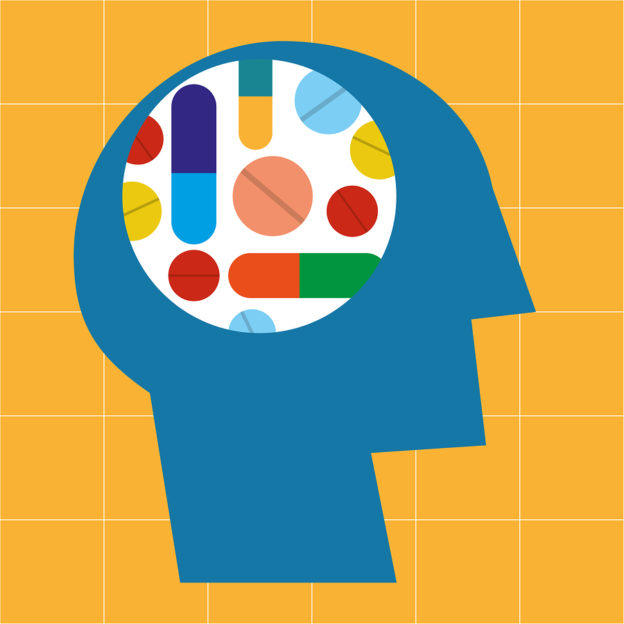By David Blyweiss, M.D., Advanced Natural Wellness
February 13, 2017
- These brain-draining medications could send you to the hospital
- Benadryl, Unisom, Xanax, Zyrtec and more…
- Protect your memories by learning your anticholinergic burden
When it comes to medications, there are plenty of terms that you probably use on a regular basis.
You might tell a friend that you need an antibiotic for an infection. Perhaps you’re on a statin drug to lower cholesterol. If you’ve got allergies, chances are good that you reach for an antihistamine.
But I’ll bet the word “anticholinergic” has never made it to your vocabulary.
Anticholinergic drugs aren’t a specific class of drugs. They just happen to have one thing in common: They block the action of acetylcholine in your brain.
Well, these meds are bad news if you want to avoid dementia and hospital visits.
- Taking a strong anticholinergic for just 60 days can cause memory problems and mild cognitive impairment. Weaker ones can have the same negative impact in as little as 90 days.
- Using anticholinergics for between one and two years increases your chances of dementia by 23%. Taking them for three or more years kicks that risk up to 54%.
- If you regularly take one or more meds with strong anticholinergic activity, you increase your likelihood of hospital admission by 33% over the course of a single year.
- The more of these anticholinergic medications you take on a routine basis, the higher your risk of early death.
Now here’s the problem. You probably take several anticholinergics on a regular basis… without even realizing it!
Benadryl, Unisom, Xanax, Zyrtec and More…
Benadryl for allergies… Dimetapp for a cold… Paxil for your depression… Elavil for your bladder symptoms… Unisom to sleep better…
All of these are very strong anticholinergics.
Other drugs that fall into this category with slightly weaker activity include Xanax, Tranxene,Valium Abilify, Tagamet, Zyrtec, Zantac, Coumadin and Tenormin.
This is the short list. But you can see how easy it is to elevate your antiocholinergic burden without even realizing it.
If you want to avoid the side-effects of these drugs, the best thing you can do is find out what your Anticholinergic Cognitive Burden (ACB) Scale is.
What’s Your Anticholinergic Burden?
The World's Quickest Solution for Ending Prostate and Urinary Misery
This has recently been revealed to be one of the only real breakthroughs in prostate health.
The seeds of a strange fruit (sometimes called "Chinese Apples") hold powerful phytonutrients that are a revolution in prostate health.
In fact, UCLA and Veterans Administration research have now proved this to be true.
Not only that, but it may be the worlds quickest solution for ending prostate misery.
Simply stated, these phytonutrients represent a huge step beyond beta sitosterol, saw palmetto, and other phytosterols alone.
Simply click HERE if you want to have fast prostate relief...restful, uninterrupted sleep...no more constant "urges to go"...enhanced virility...and optimal prostate support for life.
If you’ve been experiencing memory loss, you’ve probably taken all sorts of tests to try and get to the root of your problem.
But has your healthcare professional ever checked to find out what your anticholinergic burden is?
It’s unlikely. However, the tools are available if you want to check it out yourself.
The Aging Brain Care website was developed by the Indiana University Center for Aging Research. And it contains a list of all known anticholinergic medications, along with how they rank from a scale of one to three.
Go through it and find out which ones you use. Write down a “1” for every medication you take with an ACB score of one, a “2” for every medication you take with a score of two and so on. Then add them all up to find out what your anticholinergic burden is.
Every point you add increases your risk of cognitive impairment by about 13%, your risk of hospitalization by 11% and your chances of an early death by about 26%.
Yes, you read that right. One single point can make that much difference! So imagine the harm that’s occurring in your brain and body if you’re taking several of these medications.
Plus, the effects appear to be cumulative. So the longer you take them, the greater your risk of experiencing serious health and memory problems.
Once you have your score in hand, talk to your doctors about alternative treatments that may work just as well… without destroying your cognitive abilities.
SOURCES:
Gray SL, et al. Cumulative use of strong anticholinergics and incident dementia: a prospective cohort study. JAMA Intern Med. 2015 Mar;175(3):401-7.
Commonly used drugs lead to more doctor’s office, hospital and emergency department visits. News Release. Indiana University. Dec 2016.
Campbell NL, et al. Association of Anticholinergic Burden with Cognitive Impairment and Health Care Utilization Among a Diverse Ambulatory Older Adult Population. Pharmacotherapy. 2016 Nov;36(11):1123-1131.
Fox C, et al. Anticholinergic medication use and cognitive impairment in the older population: the medical research council cognitive function and ageing study. J Am Geriatr Soc. 2011 Aug;59(8):1477-83.







